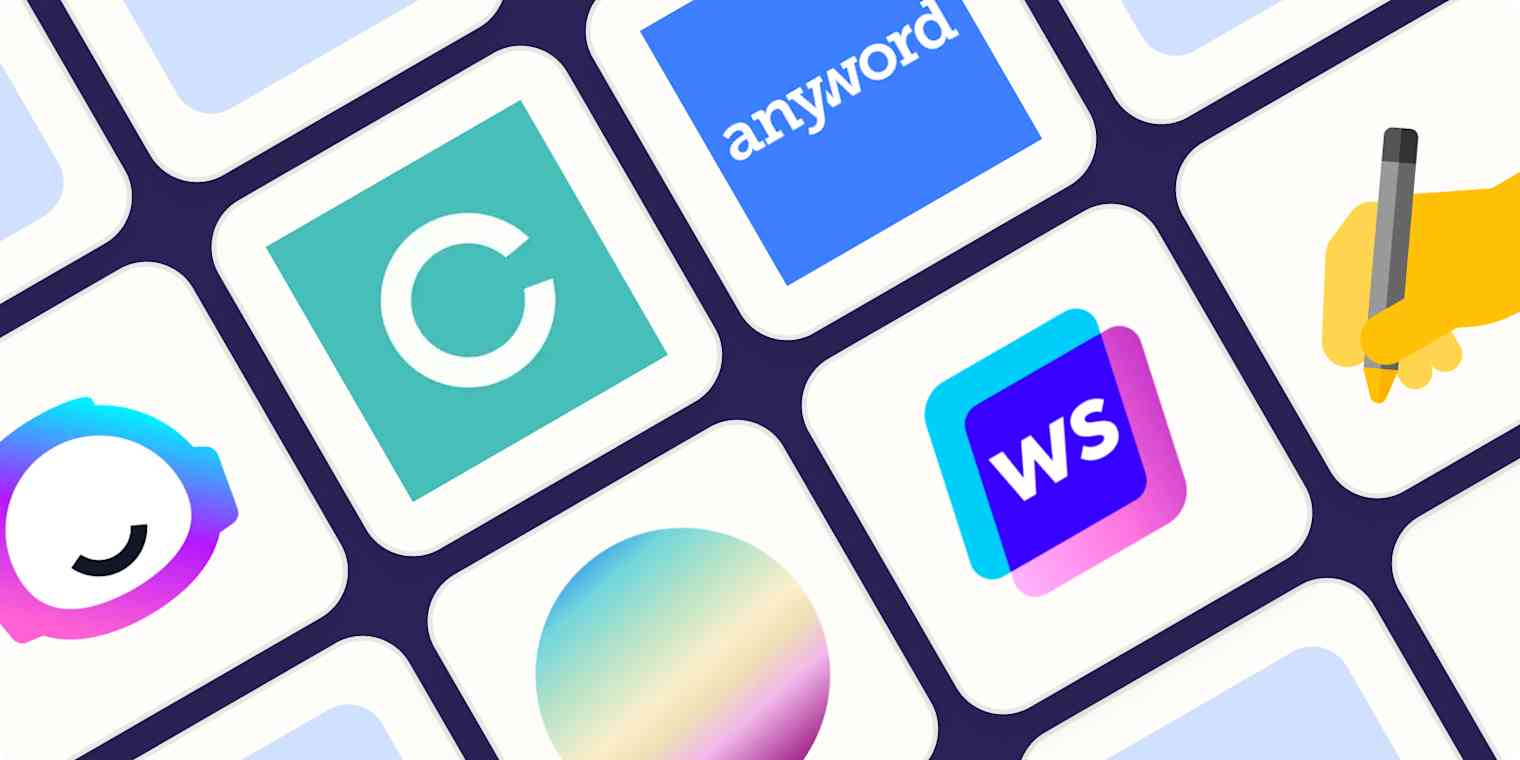Since ChatGPT burst onto the scene last year, AI writing tools have been big news. While they aren't taking over the world (yet), they are rapidly maturing and have reached the point where they can absolutely be useful—at least in the right circumstances. Used correctly, these AI text generators can help you work better and faster, and create more polished and on-brand copy.
Of course, all AI writing software needs human supervision to deliver the best results. Left to its own devices, it tends to produce fairly generic and frequently incorrect content, even if it can pass for something a human wrote. Now that AI tools are increasingly popular, people also seem more aware of what bland AI-produced content reads like and are likely to spot it—or at least be suspicious of content that feels like it lacks something.
I've been covering this kind of generative AI technology for almost a decade. Since AI is supposedly trying to take my job, I'm somewhat professionally interested in the whole situation. Still, I think I'm pretty safe for now. These AI writing tools are getting incredibly impressive, but you have to work with them, rather than just letting them spit out whatever they want.
So, if you're looking for an AI content generator that will help you write compelling copy, publish blog posts a lot quicker, and otherwise take some of the slow-paced typing out of writing, you've come to the right place. Let's dig in.
The best AI writing software
Jasper for businesses
Copy.ai for copywriting
Anyword for assisting you with writing
Sudowrite for fiction
Writer for a non-GPT option
Writesonic for GPT-4 content
Rytr for an affordable AI writer
How do AI writing tools work?
Search Google for AI writing software, and you'll find dozens of different options, all with suspiciously similar features. There's a big reason for this: 95% of these AI writing tools use the same large language models (LLMs) as the back end.
Some of the bigger apps are also integrating their own fine-tuning or using other LLMs like Claude. But most are really just wrappers connected to OpenAI's GPT-3 and GPT-4 APIs, with a few extra features built on top—even if they try to hide it in their own marketing materials. If you wanted to, you could even create your own version of an AI writing assistant without code using Zapier's OpenAI integrations—that's how much these apps rely on GPT.
See how one writer created an AI writing coach with GPT and other ways you can use OpenAI with Zapier.
Now this isn't to say that none of these AI-powered writing apps are worth using. They all offer a much nicer workflow than ChatGPT or OpenAI's playground, both of which allow you to generate text with GPT as well. And the better apps allow you to set a "voice" or guidelines that apply to all the text you generate. But the difference between these apps isn't really in the quality of their output. With a few exceptions, you'll get very similar results from the same prompt no matter which app you use—even if they use different LLMs. Where the apps on this list stand out is in how easy they make it to integrate AI text generation into an actual workflow.
As for the underlying LLM models themselves, they work by taking a prompt from you, and then predicting what words will best follow on from your request, based on the data they were trained on. That training data includes books, articles, and other documents across all different topics, styles, and genres—and an unbelievable amount of content scraped from the open internet. Basically, LLMs were allowed to crunch through the sum total of human knowledge to form a deep learning neural network—a complex, many-layered, weighted algorithm modeled after the human brain. Yes, that's the kind of thing you have to do to create a computer program that generates bad poems.
If you want to dive more into the specifics, check out the Zapier articles on natural language processing and how ChatGPT works. But suffice it to say: GPT and other large language models are incredibly powerful already—and because of that, these AI writing tools have a lot of potential.
What makes the best AI text generator?
How we evaluate and test apps
Our best apps roundups are written by humans who've spent much of their careers using, testing, and writing about software. Unless explicitly stated, we spend dozens of hours researching and testing apps, using each app as it's intended to be used and evaluating it against the criteria we set for the category. We're never paid for placement in our articles from any app or for links to any site—we value the trust readers put in us to offer authentic evaluations of the categories and apps we review. For more details on our process, read the full rundown of how we select apps to feature on the Zapier blog.
We know that most AI text generators rely on the various versions of GPT, and even those that don't are using very similar models, so most apps aren't going to stand out because of some dramatic difference in the quality of their output. Creating effective, human-like text is now table stakes. It was required for inclusion on this list—but not sufficient on its own.
As I was testing these apps, here's what else I was looking for:
Tools powered by GPT or a similar large language model with well-documented efficacy. In practice, this means that most but not all of the AI writing tools on this list use GPT to a greater or lesser degree. Many apps are starting to hide what models they use and claim to have a lot of secret sauce built on top (because there's a marketing advantage in being different and more powerful), but the reality is that nine times out of ten, it's the GPT API that's doing the heavy lifting.
An interface that gives you a lot of control over the text output. The more options you have to influence the tone, style, language, content, and everything else, the better. I didn't want tools where you just entered a headline and let the AI do the rest; these are all tools that you collaborate with, so you can write great copy quickly. The best AI writing tools also let you set a default brand voice that's always on.
Ease of use. You shouldn't have to fight to get the AI to do what you want. With AI writing software like this, there will always be some redoing and reshaping to get the exact output you want, but working with the AI shouldn't feel like wrangling a loose horse. Similarly, great help docs and good onboarding were both a major plus.
Affordability. ChatGPT is currently free, and all these tools are built on top of an API that costs pennies. There was no hard and fast price limit, but the more expensive tools had to justify the extra expense with better features and a nicer app. After all, almost every app will produce pretty similar outputs regardless of what it costs.
Apps that weren't designed to make spam content. Previous text-generating tools could "spin" content by changing words to synonyms so that unscrupulous website owners could rip off copyrighted material and generally create lots of low-quality, low-value content. None of that on this list.
Even with these criteria, I had more than 40 different AI writing tools to test. Remember: it's relatively easy for a skilled developer to build a wrapper around the GPT API, so I had to dig deep into each one to find out if it was any good or just had a flashy marketing site.
I tested each app by getting it to write a number of different short- and long-form bits of copy, but as expected, there were very few meaningful quality differences. Instead, it was the overall user experience, depth of features, and affordability that determined whether an app made this list.
Zapier Chatbots lets you build custom AI chatbots and take action with built-in automation—no coding required. Try the writing assistant template to help you create high quality content, effortlessly.
The best AI writing generators at a glance
Best for | Standout feature | Pricing | |
|---|---|---|---|
Businesses | Mature and feature-filled AI content generation | Creator plan from $49/month; Teams plan from $125/month | |
Copywriting | Active solicitation of user input, affordable unlimited plan for high-volume users | Free plan available (2,000 words/month); Pro plan from $49/month | |
Assisting you with writing | Easy inclusion of specific details and SEO keywords, engagement scores for content | Starter plan from $49/month | |
Fiction writing | Tailored AI assistance for writing fiction, easy-to-use interface | Hobby & Student plan from $19/month | |
Non-GPT content | Transparency regarding AI model, effective as an editor for adhering to style guides | Team plan from $18/user/month | |
GPT-4 content | Choice of GPT-3.5 or GPT-4 models | Free plan available (10,000 GPT-3.5 words/month); Business plan from $19/month | |
And affordable option | Free and affordable plans | Free plan available (10,000 characters/month); Saver plan from $9/month |
Best AI writing generator for businesses
Jasper (Web)
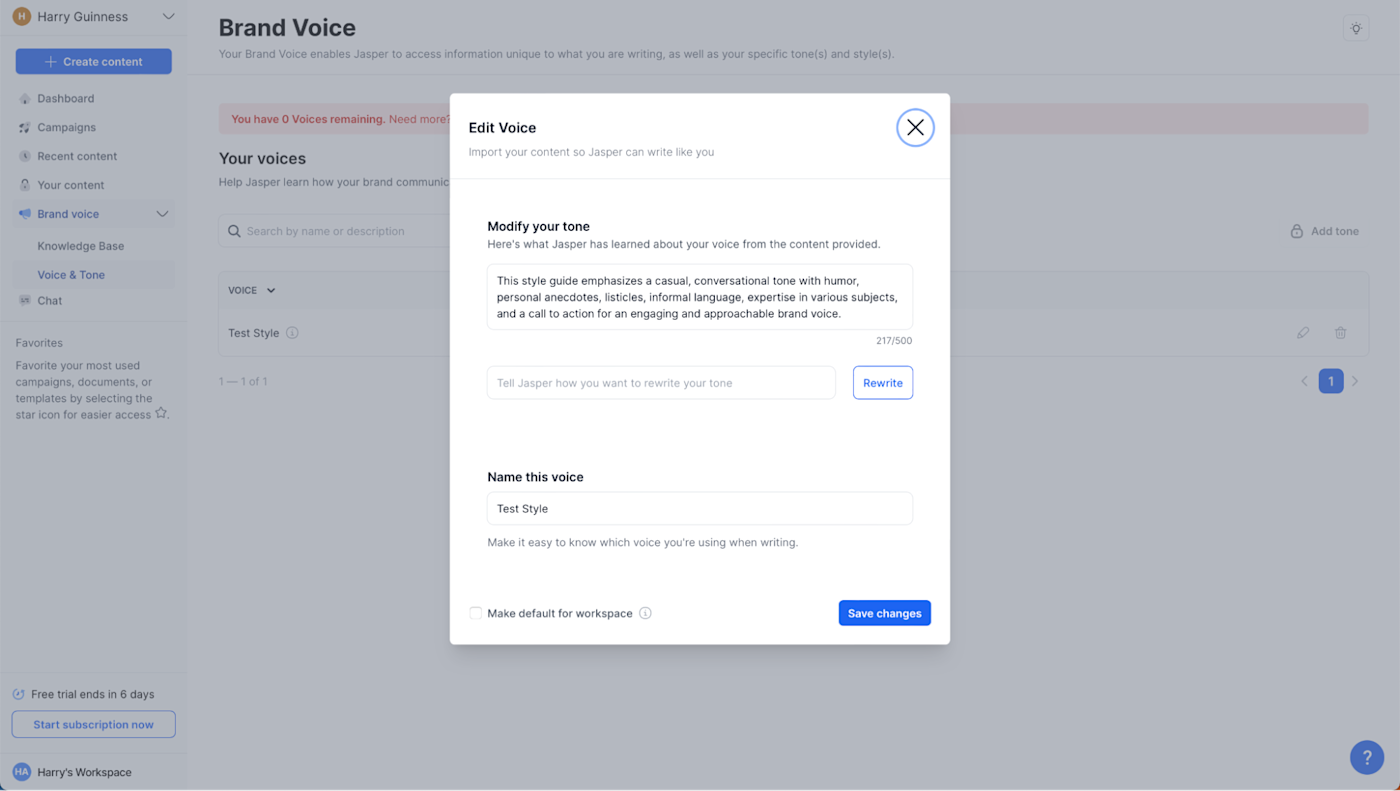
Jasper pros:
One of the most mature and feature-filled options on the list
Integrates with Grammarly, Surfer, and its own AI art generator
Jasper cons:
Expensive given that all the apps use similar language models
Jasper (formerly Jarvis) is one of the most feature-filled and powerful AI content generators. It was among the first wave of apps built on top of GPT, and its relative longevity means that it feels like a more mature tool than most of the other apps I tested. It's continued to grow and develop in the months since I first compiled this list.
If you have a business and budget isn't your primary concern, Jasper should be one of the first apps you try. It's pivoted to mostly focus on marketing campaigns rather than just generating generic AI content. That's not a bad thing, but it means that plans now start at $49/month for individual creators and $125/month for teams.
Jasper has also moved away from just being a GPT app. It claims to combine "several large language models" including GPT-4, Claude 2, and PaLM 2, so that "you get the highest quality outputs and superior uptime." While I can't say that I noticed a massive difference between Jasper's output and any other app's, it does give you a few solid controls so that your content matches your brand.
You can create a brand Voice and Tone by uploading some appropriate sample text. Based on a few examples of my writing, Jasper created a style that "emphasizes a casual, conversational tone with humor, personal anecdotes, listicles, informal language, expertise in various subjects, and a call to action for an engaging and approachable brand voice." I don't think that's a bad summary of the content I fed in, and its output for a few test blog posts like "The Enduring Popularity of Top Gun" felt closer to my writing than when I asked it to use a generic casual tone of voice. Similarly, there's a Knowledge Base where you can add facts about your business and products so Jasper gets important details right.
While other apps also offer similar features, Jasper's seemed to work better and are fully integrated with the rest of the app. For example, you can create entire marketing campaigns using your custom brand voice. Put a bit of work into fine-tuning it and uploading the right assets to your knowledge base, and I suspect that Jasper really could create some solid first drafts of marketing materials like blog outlines, social media campaign ads, and the like.
Otherwise, Jasper rounds things out with some nice integrations. It has a built-in ChatGPT competitor and AI art generator (though, again, lots of other apps have both), plays nice with the SEO app Surfer, and there's a browser extension to bring Jasper everywhere.
You can also connect Jasper to thousands of other apps using Zapier. Learn more about how to automate Jasper, or try one of the pre-built workflows below.
Create product descriptions in Jasper from new or updated Airtable records
Create Jasper blog posts from new changes to specific column values in monday.com and save the text in Google Docs documents
Run Jasper commands and send Slack channel messages with new pushed messages in Slack
Jasper pricing: Creator plan from $49/month with one brand voice and 50 knowledge assets. Teams plan starts at $125/month for three seats, three brand voices, and 150 knowledge assets.
Best AI writing app for AI copywriting
Copy.ai (Web)
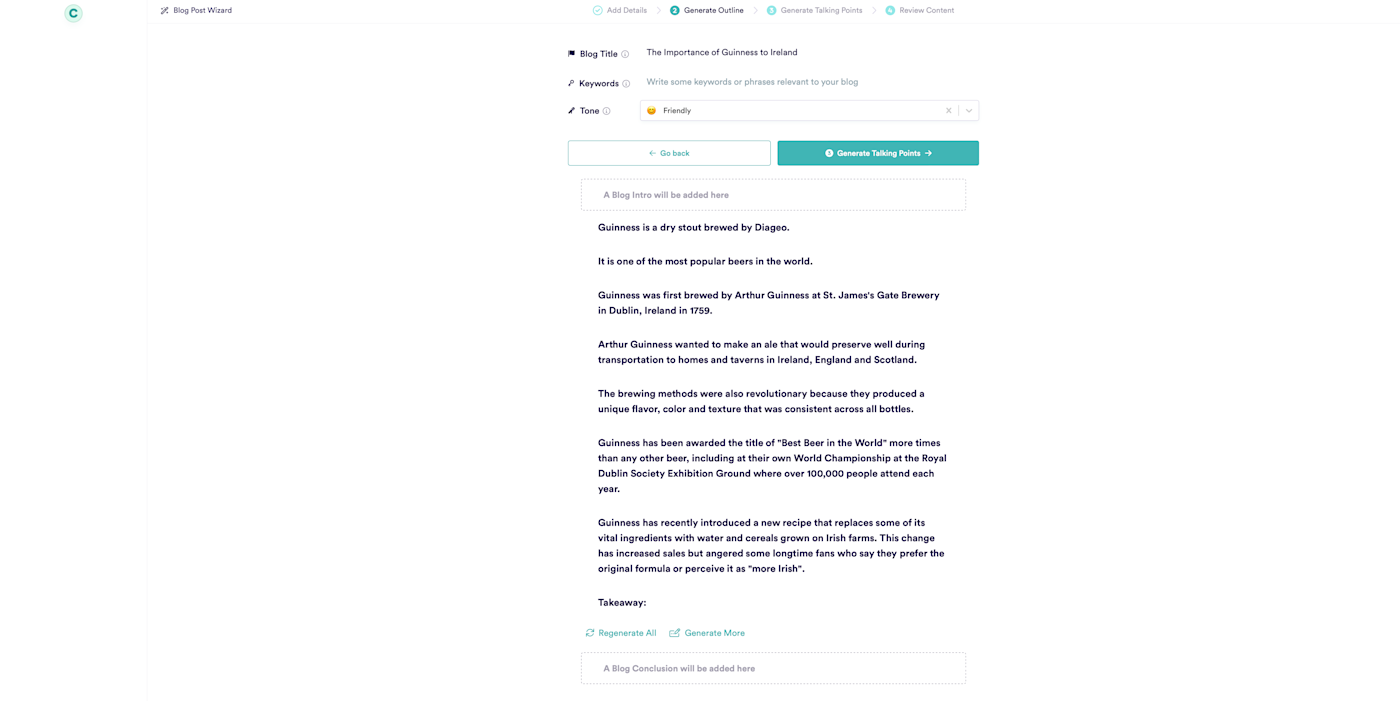
Copy.ai pros:
Has an affordable unlimited plan for high-volume users
Workflow actively solicits your input, which can lead to higher quality content
Copy.ai cons:
Expensive if you don't produce a lot of content
Pretty much anything Jasper can do, Copy.ai can do too. It has brand voices, an infobase, a chatbot, and team features (though there isn't a browser extension). Consider it the Burger King to Jasper's McDonalds.
And like the Home of the Whopper, Copy.ai appeals to slightly different tastes. While I could argue that Copy.ai has a nicer layout, the reality is it's geared toward a slightly different workflow. While Jasper lets you and the AI loose, Copy.ai slows things down a touch and encourages you to work with its chatbot or use a template that asks some deliberate, probing questions. For creating website copy, social media captions, product descriptions, and similarly specific things, it makes more sense. But for content marketing blog posts and other long-form content, it might annoy you.
The other big difference is the pricing. While both offer plans for $49/month, Copy.ai includes five user seats and unlimited brand voices. For a small team working with multiple brands, it can be a lot cheaper. Also, if you're looking for a free AI writing generator, Copy.ai also offers a free plan that includes 2,000 words per month.
Overall, there are more similarities than differences between Jasper and Copy.ai, and both can create almost all the same kinds of text. Even when it came to analyzing my voice, they both came to pretty similar conclusions. Copy.ai decided that, to mimic me, it had to "focus on creating content that is both educational and entertaining, using a conversational tone that makes readers feel like they're having a chat with a knowledgeable friend" and "not to be afraid to inject some humor or personal anecdotes." If you're in doubt, try them both out and then decide.
Copy.ai also integrates with Zapier, so you can do things like automatically sending content to your CMS or enriching leads straight from your CRM. Learn more about how to automate Copy. ai or try one of the pre-built workflows below.
Add new blog posts created with Copy.ai to Webflow
Copy.ai pricing: Free for 2,000 words per month; from $49/month for the Pro plan with 5 users and unlimited brand voices.
Best AI writing assistant
Anyword (Web)
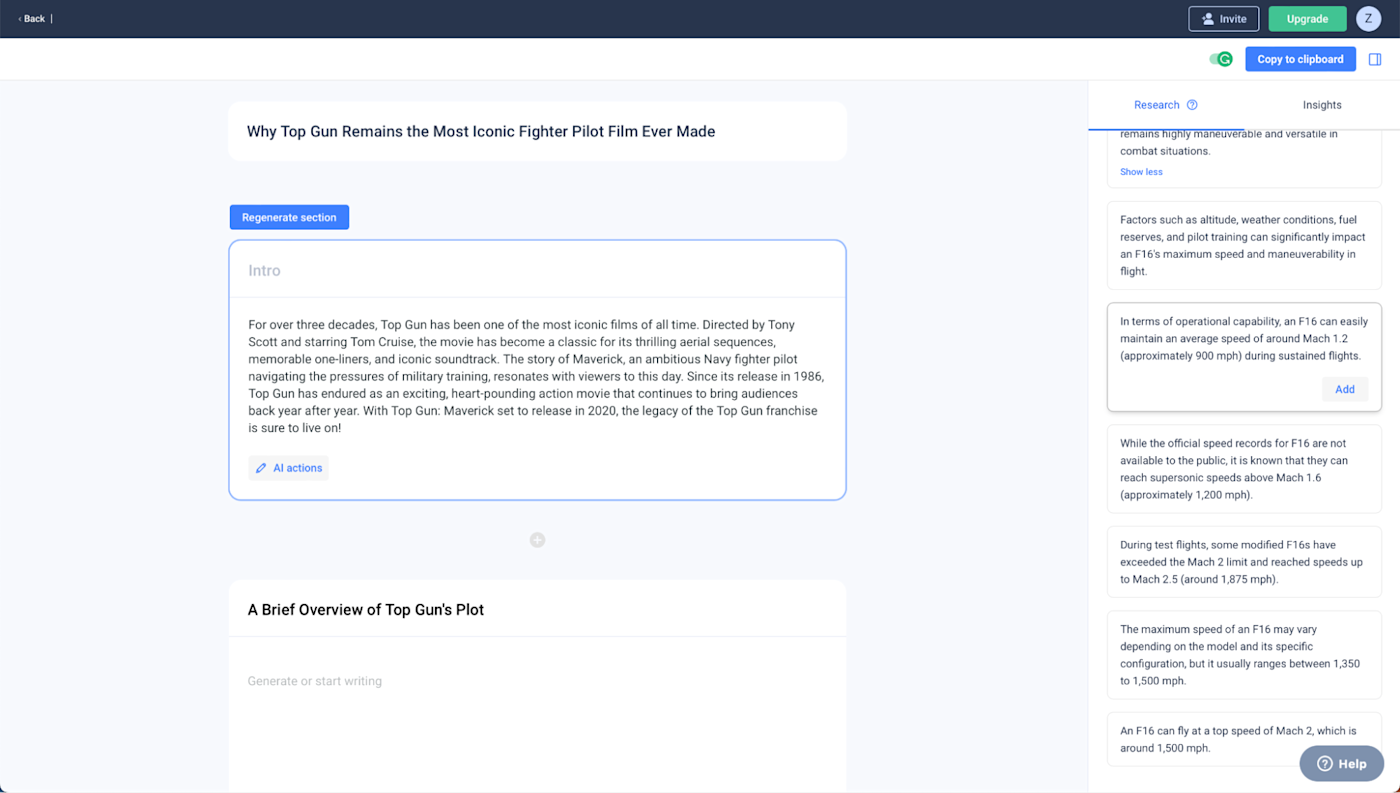
Anyword pros:
Makes it very easy for you to include specific details, SEO keywords, and other important information
Engagement scores and other metrics are surprisingly accurate
Anyword cons:
Can be slower to use
Pretty expensive for a more limited set of features than some of the other apps on this list
While you can direct the AI to include certain details and mention specific facts for every app on this list, none make it as easy as Anyword. More than any of the others, the AI here feels like an eager and moderately competent underling that requires a bit of micromanaging (and can also try to mimic your writing style and brand voice), rather than a beast that you have to tame with arcane prompts.
Take one of its main content-generating tools: the Blog Wizard. Like with Copy.ai, the setup process requires you to describe the blog post you want the AI to create and add any SEO keywords you want to target. Anyword then generates a range of titles for you to choose from, along with a predicted engagement score.
Once you've chosen a title—or written your own—it generates a suggested outline. Approve it, and you get the option for it to create an entire ~2,000-word blog post (boo!) or a blank document where you can prompt it with additional instructions for each section of the outline, telling it things like what facts to mention, what style to take, and what details to cover. There's also a chatbot-like research sidebar that you can ask questions of and solicit input from. While certainly a slower process than most apps, it gives you a serious amount of control over the content you're creating.
Anyword is definitely aimed at marketers, and its other tools—like the Data-Driven Editor and the Website Targeted Message—all allow you to target your content toward specific audiences and give things engagement scores. While I certainly can't confirm the validity of any of these scores, they at least pass the sniff test. I generally thought the AI-generated content that Anyword scored higher was better—and even when I disagreed, I still liked one of the top options.
Anyword pricing: Starter plan from $49/month for 1 user and 1 brand voice.
Best AI writing tool for writing fiction
Sudowrite (Web)
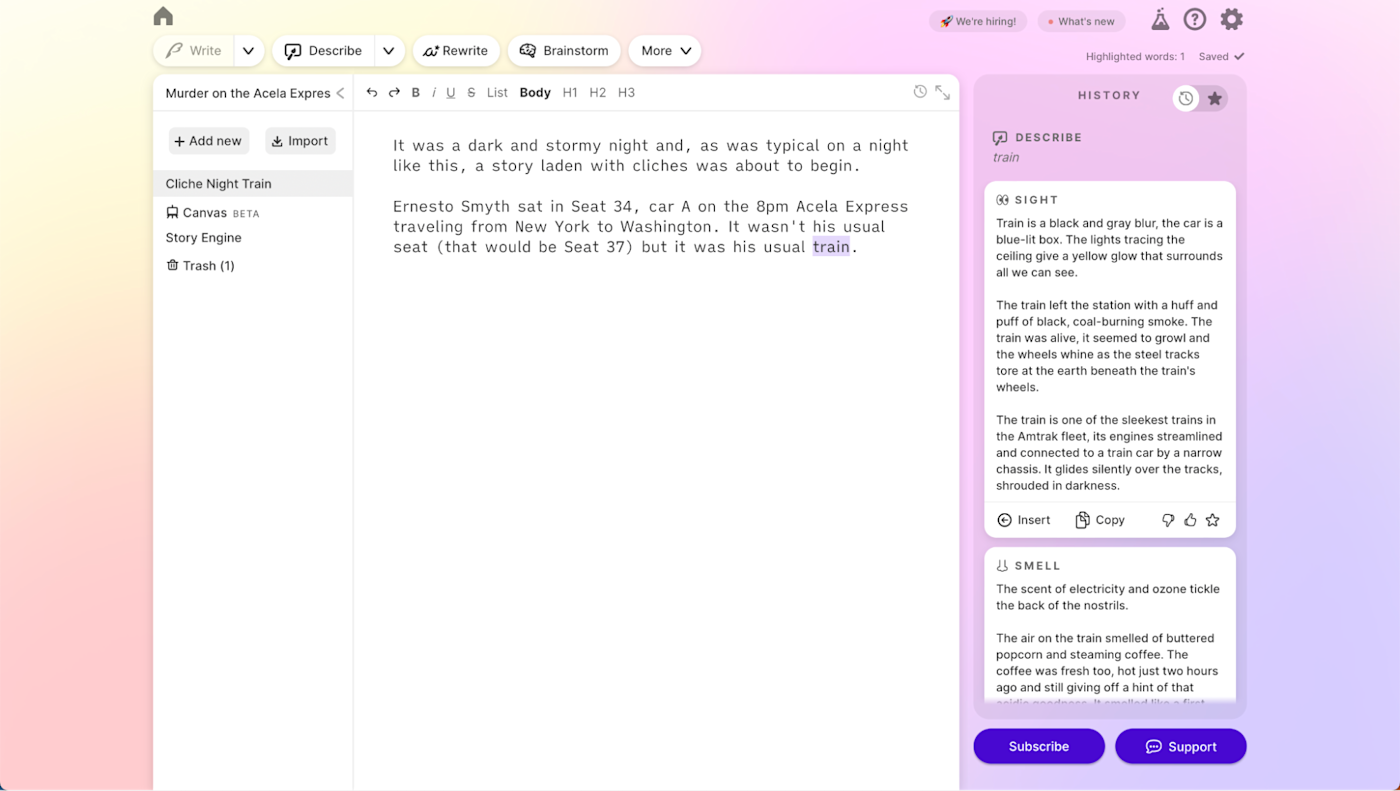
Sudowrite pros:
The only AI tool on the list explicitly aimed at writing fiction
Super fun to use if you've ever wanted to play around with fiction
Sudowrite cons:
It's still an AI text generator, so it can produce nonsensical metaphors, clichéd plots, incoherent action, and has a short memory for details
Very controversial in fiction writing circles
When I saw Sudowrite's marketing copy, I didn't think for a second it would make it onto this list. Then I tried it and…I kind of love it. Sudowrite is a totally different tool than all the others on this list because it's aimed at fiction writers. And with that, comes a lot of controversy. Sudowrite has been called "an insult to writers everywhere" and has been generally dismissed as a tool for hacks by a lot of Very Online writers. And while it's true that it's nowhere close to replacing a human author, it's fun, functional, and can genuinely help with writing a work of fiction.
The Story Engine feature, which allows you to generate a full work of fiction over a few days by progressively generating each story beat, has attracted the most attention (it works but takes lots of hand-holding and your novel will be weird). But I prefer its assistive tools.
Let's start with Describe. Select a word or phrase, click Describe, and the AI will generate a few suggestions for the sight, smell, taste, sound, and touch of the thing, as well as a couple of metaphors. If you're the kind of writer who struggles to add sensory depth to your short stories, it can help you get into the habit of describing things in more interesting ways.
Then there's Brainstorm. It allows you to use the AI to generate possible dialogue options, character names and traits, plot points, places, and other details about your world from your descriptions and cues. If you know you want a big hairy guy with a huge sword but can't think of a good name, it can suggest a few, like Thorgrim and Bohart.
And these are just scratching the surface. Sure, if you over-rely on the AI to solve all your problems, you'll probably end up with an impressively generic story. But if you use it as a writing buddy to bounce ideas off and get you out of a rut, it's got serious potential.
Best of all, Sudowrite is super easy to use. The onboarding, tool tips, and general helpful vibe of the app are something other developers could learn from.
Sudowrite pricing: Hobby & Student plan from $19/month for 30,000 AI words/month.
Best AI text generator for a non-GPT option
Writer (Web)
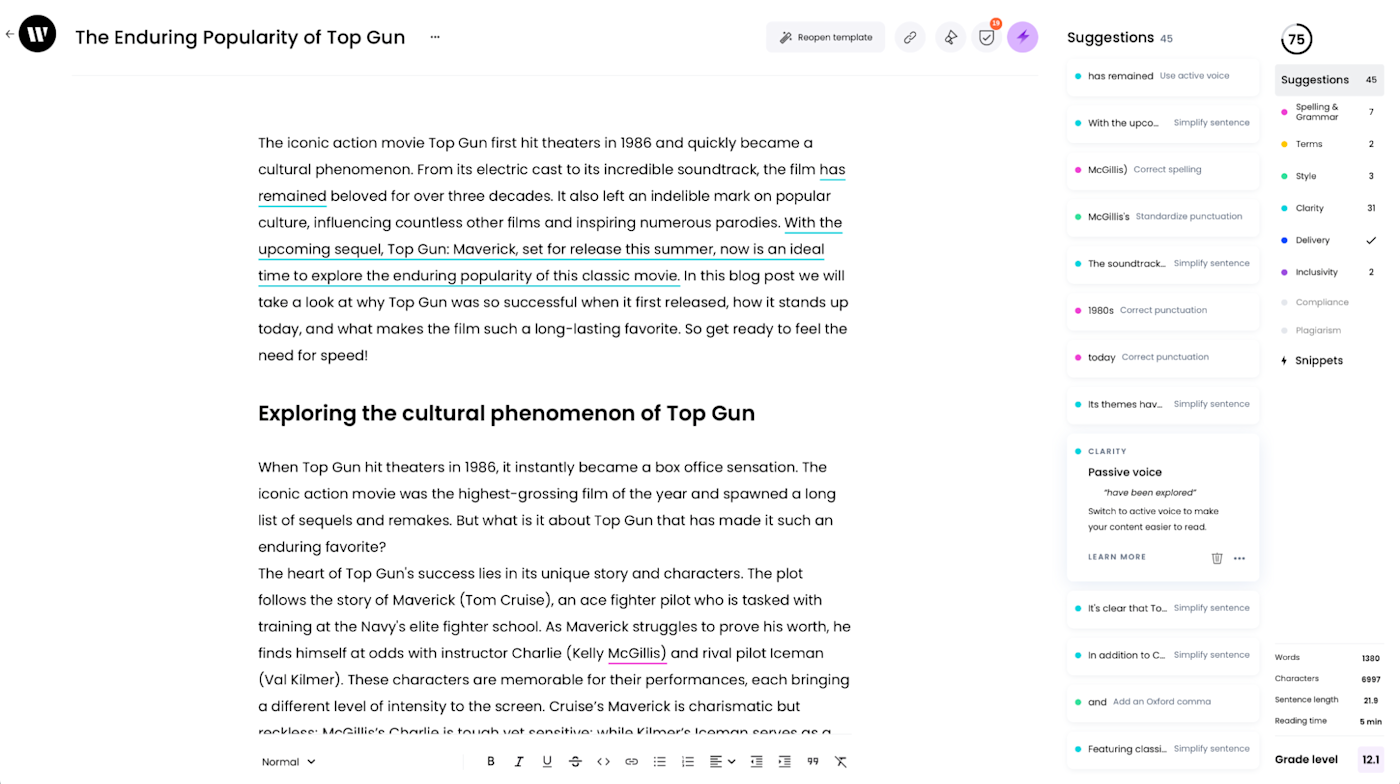
Writer pros:
Not based on GPT, so free of a lot of the controversy surrounding LLMs
Surprisingly capable as an editor, making sure your team sticks to the style guide and doesn't make any wild claims
Writer cons:
Requires a lot more setup to get the most from
GPT comes with quite a lot of baggage. OpenAI has been less than transparent about exactly what data was used to create the various versions of GPT-3 and GPT-4, and it's facing various lawsuits over the use of copyrighted material in its training dataset. No one is really denying that protected materials—potentially from pirated databases—were used to train GPT; the question is just whether or not it falls under fair use.
For most people, this is a nebulous situation filled with edge cases and gray areas. Realistically, it's going to be years before it's all sorted out, and even then, things will have moved on so far that the results of any lawsuit are likely to be redundant. But for businesses that want to use AI writing tools without controversy attached, GPT is a no-go—and will be for the foreseeable future.
Which is where Writer comes in.
Feature-wise, Writer is much the same as any of my top picks. (Though creating a specific brand voice that's automatically used is an Enterprise-only feature; otherwise, you have to use a lot of checkboxes in the settings to set the tone.) Some features, like the chatbot, are a little less useful than they are in the GPT-powered apps, but really, they're not why you'd choose Writer.
Where it stands out is the transparency around its Palmyra LLM. For example, you can request and inspect a copy of its training dataset that's composed of data that is "distributed free of any copyright restrictions." Similarly, Palmyra's code and model weights (which determines its outputs) can be audited, it can be hosted on your own servers, and your data is kept secure and not used for training by default. As an AI-powered tool, it's as above board as it comes.
In addition to generating text, Writer can work as a company-specific Grammarly-like editor, keeping on top of legal compliance, ensuring you don't make any unsupported claims, and checking that everything matches your style guide—even when humans are writing the text. As someone who routinely has to follow style guides, this seems like an incredibly useful feature. I wasn't able to test it fully since I don't have a personal style guide to input, but Writer correctly fixed things based on all the rules that I set.
In side-by-side comparisons, Writer's text generations sometimes felt a little weaker than the ones from Jasper or Copy.ai, but I suspect a lot of that was down to how things were configured. Writer is designed as a tool for companies to set up and train with their own data, not run right out of the box. I'd guess my random blog posts were a poor test of how it should be used in the real world.
Writer also integrates with Zapier, so you can use Writer to create content directly from whatever apps you use most. Learn more about how to automate Writer, or take a look at these pre-made workflows.
Create new outlines or drafts in Writer based on briefs from Asana
Generate marketing content from project briefs in Trello
Writer pricing: Team from $18/user/month for up to 5 users; after that, it's an Enterprise plan.
Best AI text generator for GPT-4 content
Writesonic (Web)
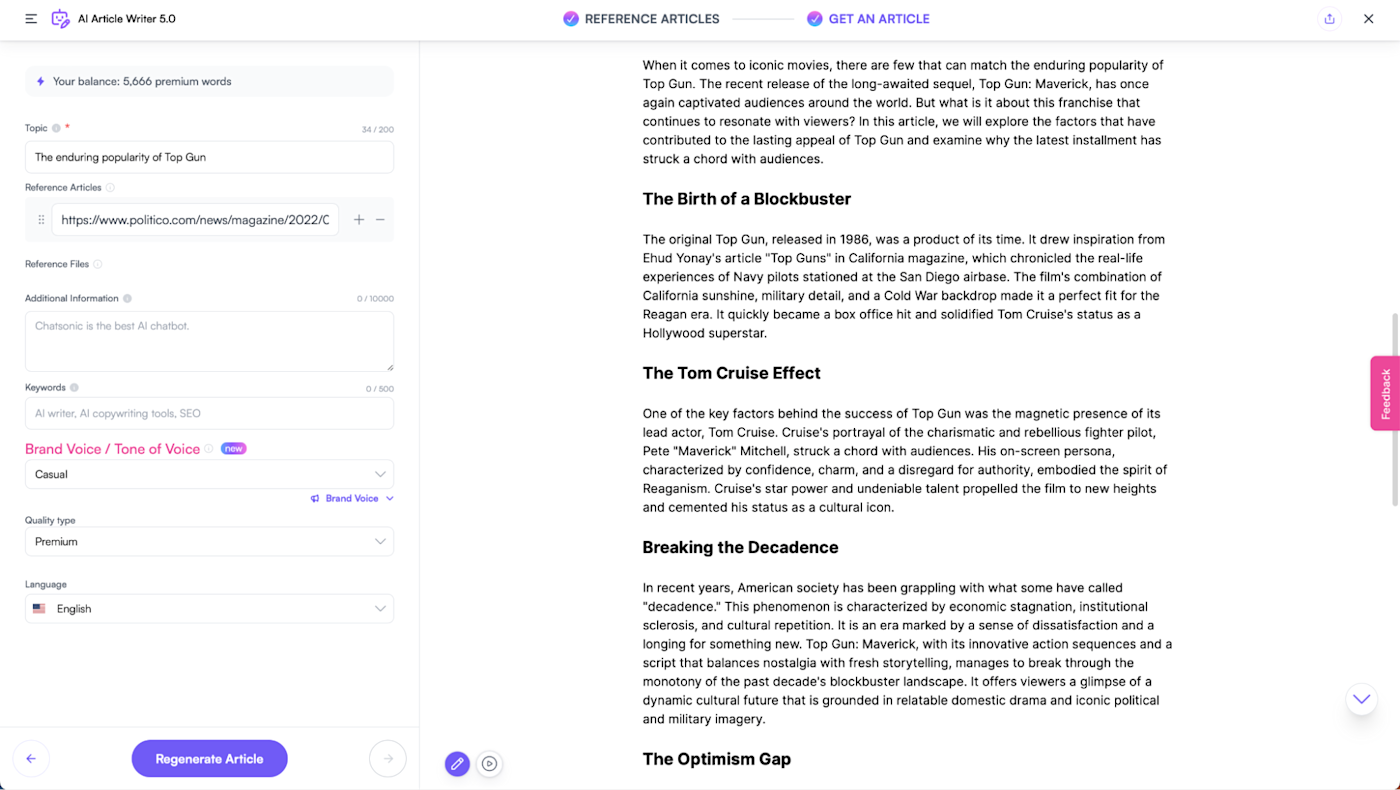
Writesonic pros:
Allows you to select what GPT model is used to generate text
Generous free plan and affordable paid plans
Writesonic cons:
A touch too focused on SEO content for my taste
While almost all the tools on this list use GPT, most are pretty vague about which particular version of it they use at any given time. This matters because the most basic version of the GPT-3.5 Turbo API costs $0.002/1K tokens (roughly 750 words), while GPT-4 starts at $0.06/1K tokens, and the most powerful version costs $0.12/1K tokens. All this suggests that most apps may not use GPT-4 in all circumstances, and instead probably rely on one of the more modest (though still great) GPT-3 models for most text generation.
If having the latest and greatest AI model matters to you, Writesonic is the app for you. Writesonic doesn't hide what AI model it uses. It even allows you to choose between using GPT-3.5 and GPT-4, at least on Business plans.
Whether the content you create will benefit from the extra power of GPT-4 or not depends. In my experience using GPT-4 through ChatGPT, the latest model is more accurate and, essentially, more sensible in how it responds. If you're churning out low-stakes copy variations for your product listings, you likely won't see much improvement. On the other hand, for long-form original blog posts, it could make a difference. Either way, the transparency in which model you're using at any given time is a huge bonus.
Feature-wise, Writesonic is much the same as any of the other apps on this list, with a Google Docs-style editor, the option to set a brand voice, a few dozen copy templates, a chatbot, a browser extension, and Surfer integration. It's cool that you can set reference articles when you're generating a blog post, but it introduces the real possibility of inadvertent plagiarism if you aren't careful with how you use it. (Its most offbeat feature is a surprisingly solid AI-powered custom chatbot builder that's due to be spun out into its own app soon.) Overall, it's pretty nice to use and skews more toward SEO-optimized content marketing—but like with all the apps, you can use it to generate whatever you want.
Writesonic also integrates with Zapier, so you can send new copy to any of the other apps you use in your writing workflow. Learn more about how to automate Writesonic, or get started with one of these examples.
Create a Google Doc with new content from Writesonic
Generate product descriptions with Writesonic from spreadsheet rows in Google Sheets
Writesonic pricing: Free for 10,000 GPT-3.5 words per month; Business from $19/month for 200,000 Premium words or 33,333 GPT-4 words.
Best free AI writing generator (with affordable upgrades)
Rytr (Web)
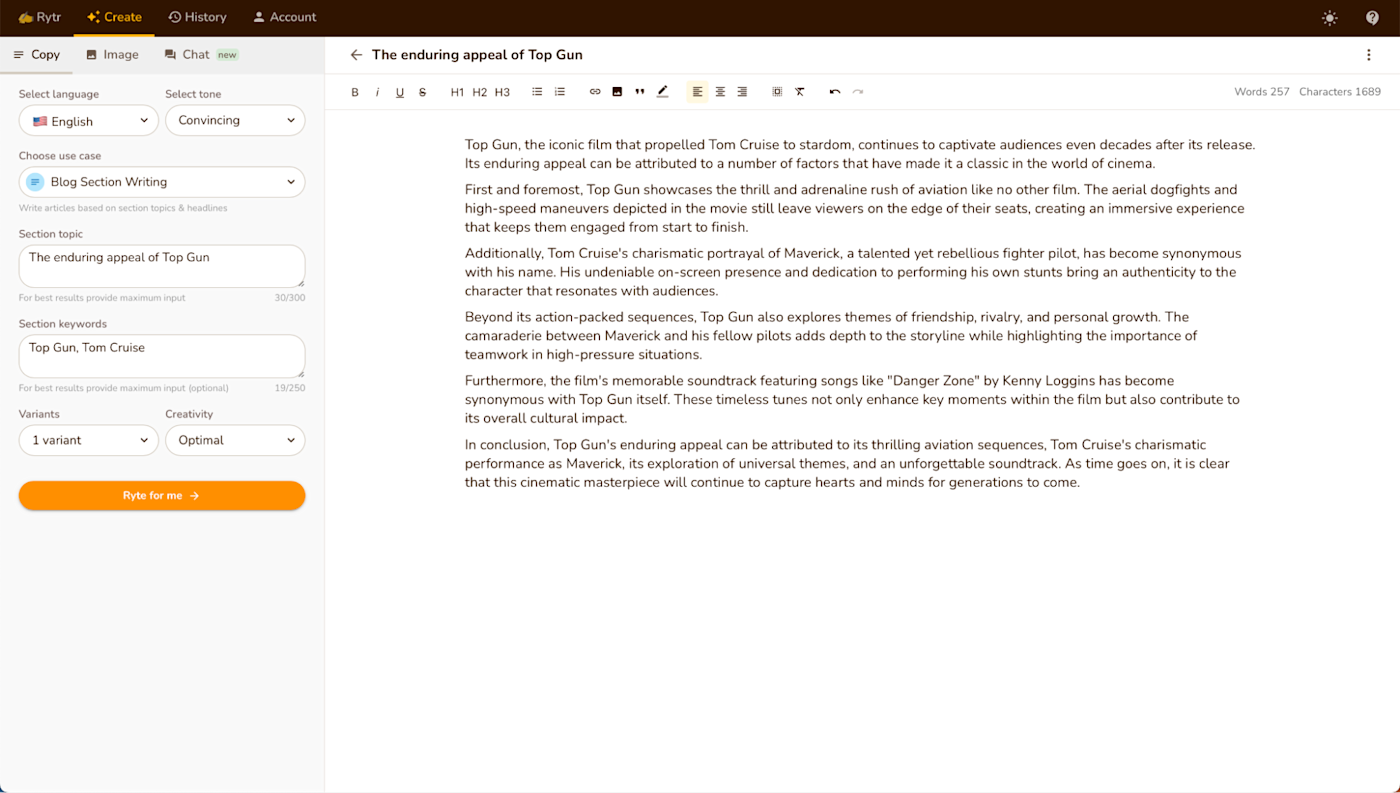
Rytr pros:
A solid free plan and a cheap high-volume plan (though Writesonic offers better value for an unlimited plan)
It includes a basic AI art generator as part of every plan
Rytr cons:
The app is more basic than more expensive offerings
Unlimited plan isn't very competitive
Most of the apps on this list are aimed at professionals, businesses, and anyone else with a budget. The Jasper, Copy.ai, and Anyword plans I considered all started at $49/month. That isn't exactly a hobbyist-friendly sum of money, so if you want to explore AI text generators without spending as much, give Rytr a go.
There's a free plan that's good for 10,000 characters (around 2,500 words) per month, and it includes a lot of the features, like a plagiarism checker, and a few AI-generated images. The Saver plan starts at $9/month and allows you to generate 100,000 characters (around 25,000 words) per month. On that plan, you're also able to generate up to 20 images a month, which many other apps charge extra for. (There's also an unlimited plan for $29/month, but at that point, Writesonic is a better value.)
Feature-wise, there are some trade-offs. Rytr is a little less competent at generating long-form content without you guiding it through the process, and there are fewer templates for specific things. The interface also isn't as polished, and there isn't as much hand-holding to get you started. Still, as Rytr is using GPT like almost all the other apps on this list, you should be able to get it to produce substantially similar output.
Rytr Pricing: Free plan for 10,000 characters/month and lots of other features; Saver plan from $9/month for 100,000 characters; Unlimited plan from $29/month.
Other AI writing tools to consider
With so many AI text-generating tools out there, a few good ones worth considering didn't make this list, only because they didn't meet my initial criteria in some way. If none of the AI writers I chose fit the bill for you, here are a few other options worth looking into:
ChatGPT is surprisingly competent and fun to use. And best of all, it's free. (Google Bard is a little less excellent on the content production side.)
Wordtune and Grammarly are both great tools for editing and improving your own writing. GrammarlyGO just isn't as flexible as my other picks.
Notion AI adds a powerful AI tool directly into Notion. If you already use Notion, it's worth checking out, but it's a lot to learn if you just want a text generator. (Same goes for AI within any other Notion alternative, like Coda AI.)
Surfer and Frase are both AI-powered SEO tools. They fell slightly out of scope for this list, but they can both help you optimize and improve your content—AI-generated or not.
All of the apps on this list offer at the very least a free trial, so I'd suggest trying some of them out for a few minutes until you find the one that seems to work best with your workflow.
Related reading:
This article was originally published in April 2023. The most recent update was in September 2023.
